Taxes on selling land in Ohio can cost you 15-23.5% of your profits through combined federal and state capital gains taxes. But smart timing, proper deductions, and strategic planning can significantly reduce what you owe - potentially saving thousands on your land sale.
Key Takeaways:
- Ohio taxes land sale profits as regular income at rates up to 3.5%, combined with federal capital gains rates of 0-20%.
- Inherited land receives a "step-up basis" that can eliminate most capital gains taxes when sold by heirs.
- Cash buyers simplify tax reporting and offer flexible closing dates to optimize your tax timing strategy.
Quick Note: If you're looking to simplify the tax complexities and sell quickly, we buy Ohio land fast and can provide a free, no-obligation cash offer within 48 hours.
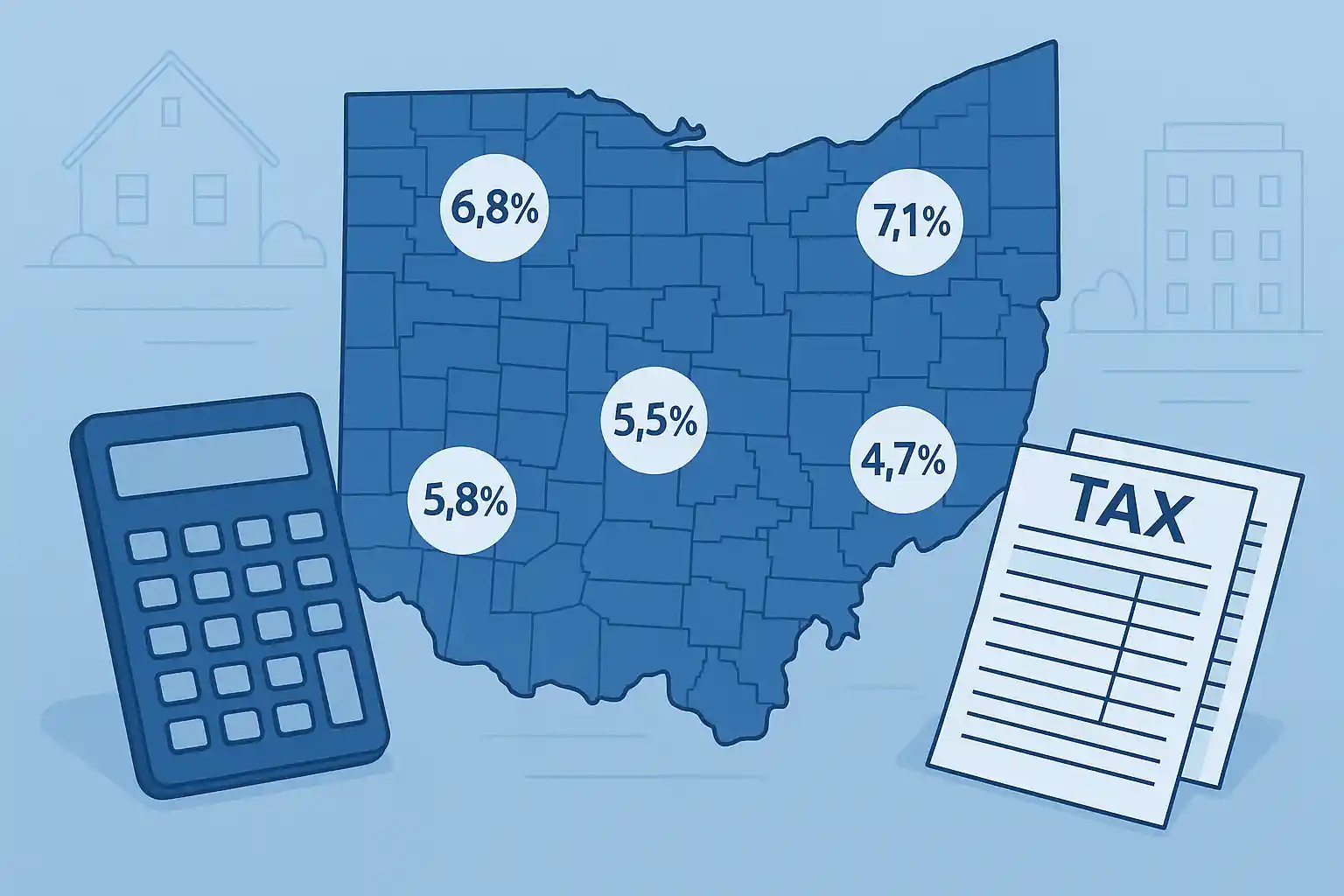
Understanding Taxes on Selling Land in Ohio
When you're considering selling your Ohio land, understanding the tax on selling land is crucial for making informed financial decisions. Whether you own vacant acreage in rural counties or residential lots in Columbus, the tax implications can significantly impact your bottom line. The good news? With proper planning and knowledge of Ohio's specific tax rules, you can navigate these complexities and potentially minimize your tax burden.
How Ohio Treats Land Sale Taxes
Ohio treats capital gains from land sales as regular income, which means your profits get added to your other income and taxed accordingly. Unlike some states with no capital gains tax, Ohio landowners face:
- State income tax rates up to 3.5% on land sale profit
- Federal capital gains rates of 0%, 15%, or 20% depending on your income
- Combined total tax rates ranging from 15% to 23.5% for most sellers
The duration you've owned your Ohio land also matters significantly. Land held for more than one year qualifies for favorable long-term capital gains treatment, while property owned for less than a year faces ordinary income tax rates that can reach much higher percentages.
Ohio-Specific Tax Considerations
Transfer Costs You'll Face
When selling land in Ohio, you'll encounter specific state-mandated fees:
- Conveyance fees: $4.00 per $1,000 of sale price
- Transfer taxes: $1.00 per $1,000 of sale price
- Total transfer costs: Approximately $500 on a $100,000 land sale
What Makes Ohio Different
Ohio's progressive tax structure means your tax rate depends on your total income for the year. If the land sale pushes you into a higher tax bracket, you could face the maximum 3.5% state rate on the gains. This is why timing your sale strategically can make a substantial difference in your tax liability.
Understanding these taxes on selling land in Ohio upfront helps you plan effectively and avoid costly surprises come tax season.
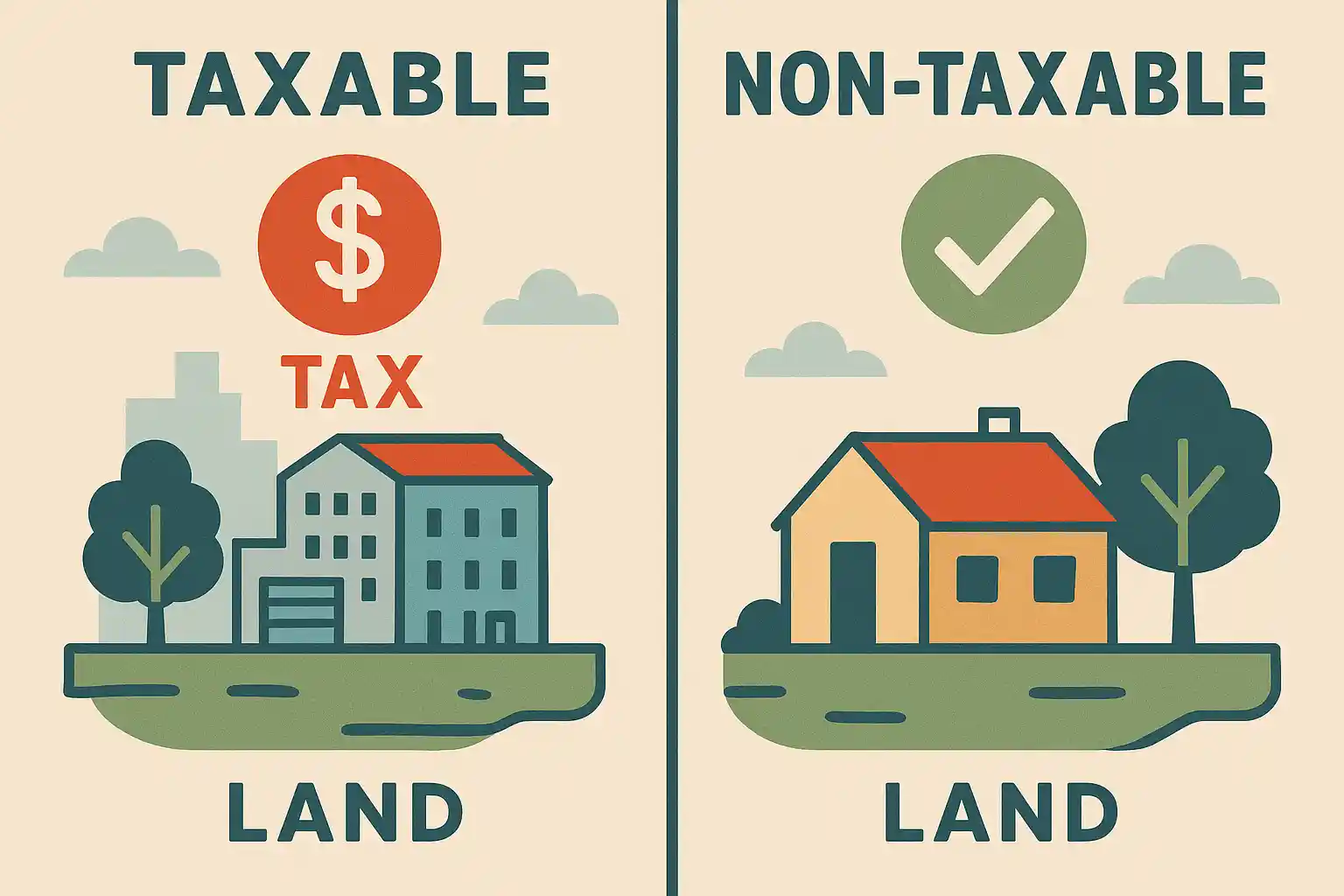
Is Your Ohio Land Sale Taxable? (What You Need to Know)
The short answer to "if I sell my land is it taxable?" in Ohio is almost always yes - but the specifics depend on several critical factors. Understanding these factors helps you prepare for tax obligations and identify potential strategies to minimize what you owe. Let's break down exactly when and how selling land by owner in Ohio becomes a taxable event.
When Ohio Land Sales Are Taxable
Your land sale triggers tax obligations in these situations:
- Profit on the sale: If you sell for more than your "adjusted basis" (purchase price plus improvements)
- Investment property: Land held for investment purposes always faces capital gains treatment
- Business use: Property used in a trade or business may have additional tax implications
- Rental land: Previously rented property may involve depreciation recapture
The key question isn't whether your sale is taxable, but rather how much tax you'll owe and what rate applies to your specific situation.
What Determines Your Tax Rate
Ohio bases your tax on selling land on several factors that directly impact your final tax bill:
Ownership Duration
- Long-term gains (over 1 year): Federal rates of 0%, 15%, or 20% plus Ohio's 3.5% maximum
- Short-term gains (under 1 year): Taxed as ordinary income at higher federal and state rates
- Holding period calculation: Starts the day after purchase, ends on sale date
Your Income Level
Ohio's progressive tax structure means higher earners face steeper rates. The land sale profit gets added to your other 2025 income, potentially pushing you into Ohio's highest 3.5% tax bracket. Combined with federal taxes, total rates can reach 23.5% for high-income sellers.
Special Circumstances That Affect Taxability
Certain situations can change your tax obligations entirely:
- Primary residence conversion: Land that was part of your main home may qualify for exclusions
- Like-kind exchanges: Ohio recognizes federal 1031 exchanges for investment property
- Installment sales: Spreading payments over multiple years can reduce annual tax impact
- Conservation easements: May provide significant tax benefits for qualifying properties
For comprehensive guidance on the entire selling process, including tax planning strategies, check out our [complete guide to selling land by owner in Ohio](http://www.primelandbuyers.com/blog/how-to-sell-land-by-owner-in-ohio).
Getting Professional Tax Guidance
Given the complexity of taxes on selling land in Ohio, consulting with a qualified tax professional before listing your property is essential. They can help you understand your specific tax situation, identify deduction opportunities, and potentially recommend timing strategies that minimize your overall tax burden.
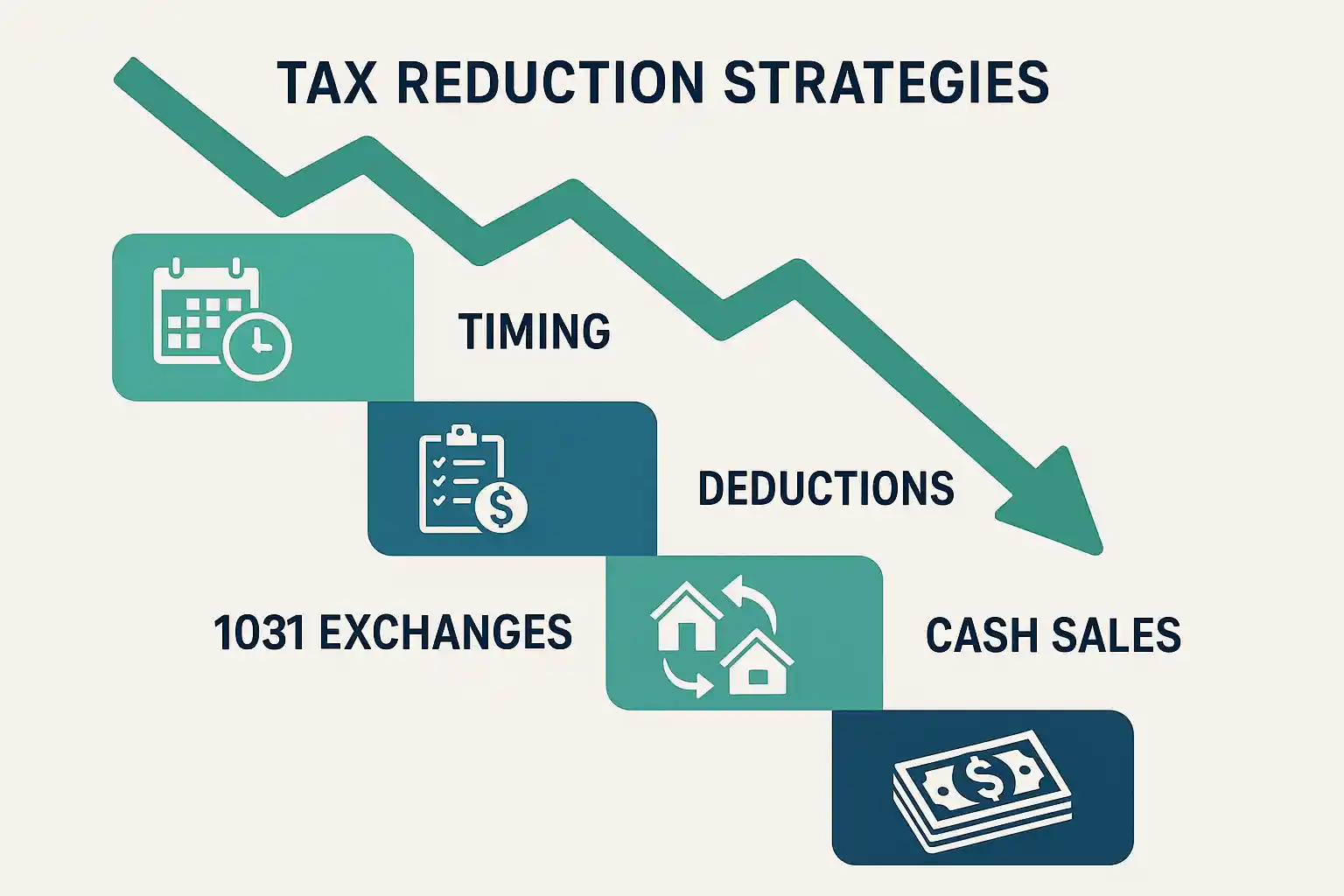
How to Minimize Capital Gains Tax When Selling Ohio Land
Smart Ohio landowners know that avoiding capital gains tax when selling land isn't about illegal schemes - it's about using legitimate strategies and proper timing to reduce your tax burden. While you can't eliminate taxes entirely, several proven methods can significantly lower what you owe on your land sale profits.
Timing Your Sale Strategically
The timing of your Ohio land sale can dramatically impact your tax liability:
- Hold for over one year: Ensures long-term capital gains treatment (lower rates)
- Spread income across tax years: Consider installment sales to avoid income spikes
- Coordinate with other income: Time the sale during lower-income years when possible
- End-of-year considerations: December vs. January sales can shift tax obligations
Maximize Your Cost Basis
Your "basis" is what you paid initially plus qualifying improvements. A higher basis means lower taxable gains:
- Document all improvements: Surveys, drainage work, clearing, fencing, access roads
- Legal and professional fees: Attorney fees, title insurance, and recording costs from the purchase
- Carrying costs: Property taxes paid, maintenance expenses during ownership
- Marketing expenses: Advertising costs, signs, and professional photography when selling
Keep detailed records of every dollar spent on your Ohio land, these expenses directly reduce your taxable gain. Also always ensure you have the Ohio land sale required documents and paperwork to complete your sale.
Consider 1031 Like-Kind Exchanges
Ohio recognizes federal 1031 exchanges, allowing you to defer capital gains taxes by reinvesting in similar property:
Exchange Requirements
- Investment or business use: Personal-use land doesn't qualify
- Like-kind property: Vacant land can be exchanged for rental property, commercial buildings, or other investment real estate
- Strict timelines: 45 days to identify replacement property, 180 days to complete
- Equal or greater value: The Replacement property must be worth at least as much as what you sold
Explore Cash Sale Benefits
Working with Ohio cash buyers for land can provide tax advantages beyond just speed and convenience:
- Faster closing timeline: Allows better control over which tax year the sale occurs
- Simplified documentation: Professional buyers handle complex paperwork accurately
- No financing contingencies: Eliminates risk of delayed closings that could affect tax planning
- Flexible closing dates: Choose the optimal timing for your specific tax situation
Advanced Tax Strategies
For higher-value properties, consider these sophisticated approaches:
- Charitable remainder trusts: Donate land to charity while retaining income stream
- Installment sales: Spread payments over multiple years to manage tax brackets
- Conservation easements: May provide substantial tax deductions for qualifying land
- Cost segregation studies: For improved property, separate land from depreciable improvements
Professional Tax Planning Services
Given the complexity of taxes on selling land in Ohio and the potential savings from proper planning, investing in professional tax advice often pays for itself. A qualified Ohio tax professional can:
- Calculate your exact tax liability under different scenarios
- Recommend timing strategies specific to your situation
- Identify all available deductions and credits
- Structure the sale to minimize overall tax impact
Remember, tax laws change frequently, and what works for one landowner may not be optimal for another. The key is getting personalized advice based on your specific circumstances and Ohio's current tax regulations.
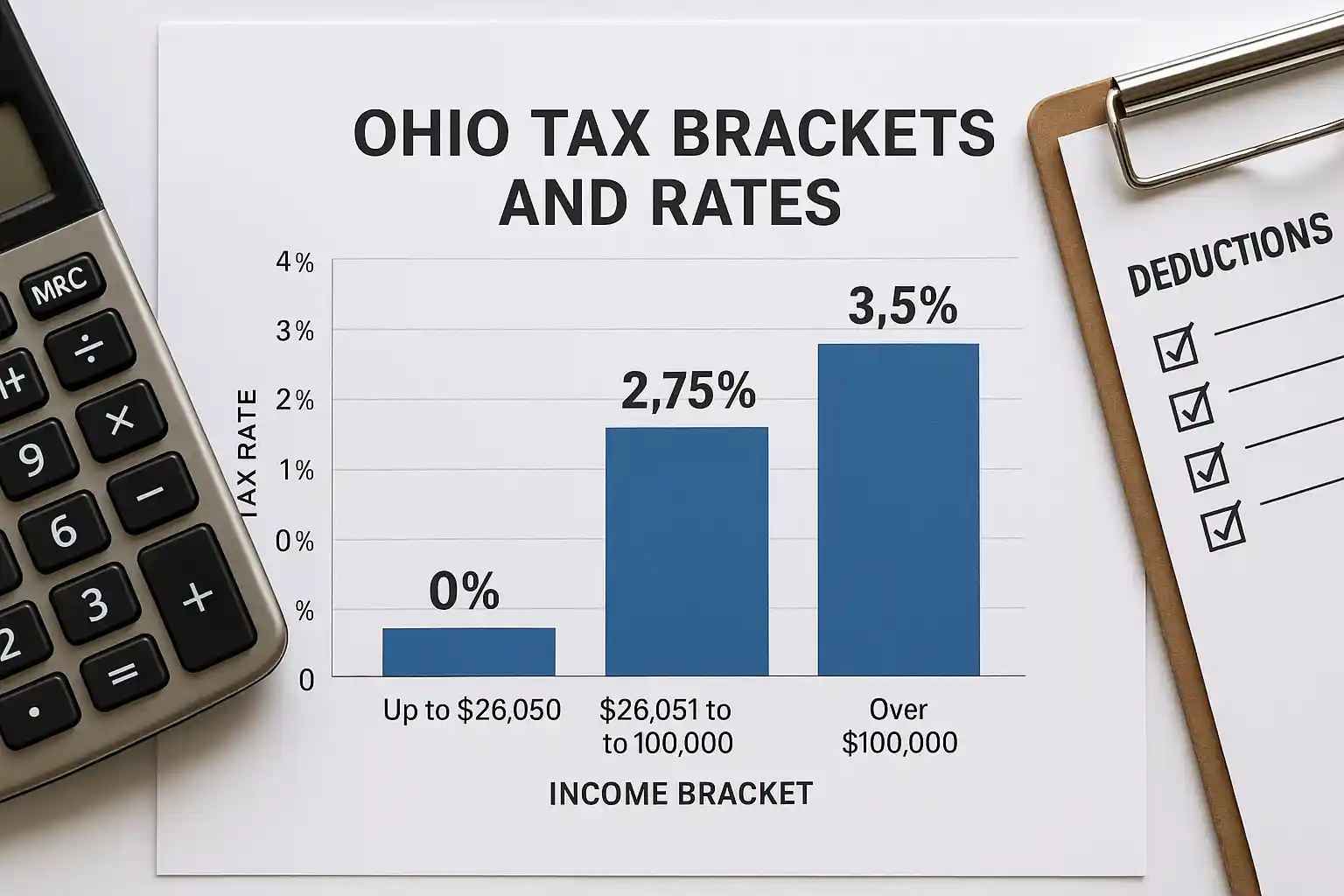
Ohio Tax Rates and Deductions for Land Sales
Understanding Ohio's specific taxes on land sale rates and available deductions can save you thousands of dollars on your land sale. Ohio's tax structure combines state income taxes with federal capital gains rates, creating a complex but navigable system for landowners who know the rules.
Ohio Capital Gains Tax Rates for 2025
Ohio treats capital gains as regular income, which means your land sale profits face the state's progressive tax rates:
State Tax Brackets
- Income up to $26,050: 0% Ohio tax rate
- Income $26,051 to $100,000: 2.75% Ohio tax rate
- Income over $100,000: 3.5% Ohio tax rate (maximum)
Combined Federal and State Rates
- Low-income sellers: 0% federal + 0-2.75% Ohio = 0-2.75% total
- Middle-income sellers: 15% federal + 2.75-3.5% Ohio = 17.75-18.5% total
- High-income sellers: 20% federal + 3.5% Ohio = 23.5% total
Ohio Transfer Costs and Fees
When calculating your net proceeds from an Ohio land sale, factor in these mandatory costs:
Required Transfer Expenses
- Conveyance fee: $4.00 per $1,000 of sale price
- Transfer tax: $1.00 per $1,000 of sale price
- Recording fees: Typically $28-$50 for deed recording
- Title insurance: Varies by sale price and title company
Example: On a $100,000 land sale, expect approximately $500-$600 in Ohio transfer costs.
Deductions That Reduce Your Taxable Gain
Ohio follows federal guidelines for determining your adjusted basis, which directly impacts your taxable gain:
Qualifying Cost Basis Additions
- Purchase price: Original amount paid for the land
- Closing costs: Title insurance, attorney fees, and recording costs from when you bought
- Capital improvements: Permanent additions that increase property value
- Professional fees: Surveying, environmental assessments, legal consultations
Allowable Improvement Deductions
- Land preparation: Grading, drainage systems, soil improvements
- Access improvements: Roads, driveways, bridges, culverts
- Utilities: Well drilling, septic systems, electrical service installation
- Boundary work: Fencing, surveying, boundary markers
- Environmental work: Wetland mitigation, erosion control measures
Special Ohio Tax Considerations
Primary Residence Partial Exclusion
If your land was part of your primary residence property, you may qualify for a partial capital gains exclusion:
- Single filers: Up to $250,000 exclusion on qualifying gains
- Married filing jointly: Up to $500,000 exclusion on qualifying gains
- Requirements: Must have lived on the property 2 of the last 5 years
Investment Property Depreciation
For land previously used in rental or business activities:
- Depreciation recapture: May apply to improvements at 25% federal rate plus Ohio's 3.5%
- Section 1231 property: Special rules for business-use land
- Mixed-use considerations: Complex calculations for partially personal/business property
Ohio-Specific Tax Benefits
Agricultural Use Exemptions
Ohio offers special considerations for agricultural land:
- Current Agricultural Use Valuation (CAUV): May affect property tax basis calculations
- Farm income averaging: Potential federal benefit for qualifying agricultural sales
- Conservation programs: CRP and similar programs may impact tax treatment
Timing Benefits for Ohio Sellers
Strategic timing can optimize your Ohio tax situation:
- Year-end sales: Control which tax year receives the income
- Income management: Coordinate with other income sources to stay in lower brackets
- Installment sales: Spread income across multiple tax years
- Estimated payments: Ohio requires quarterly payments on large gains
Understanding these taxes on selling land in Ohio specifics helps you plan effectively and potentially save significant money through proper deduction documentation and timing strategies.
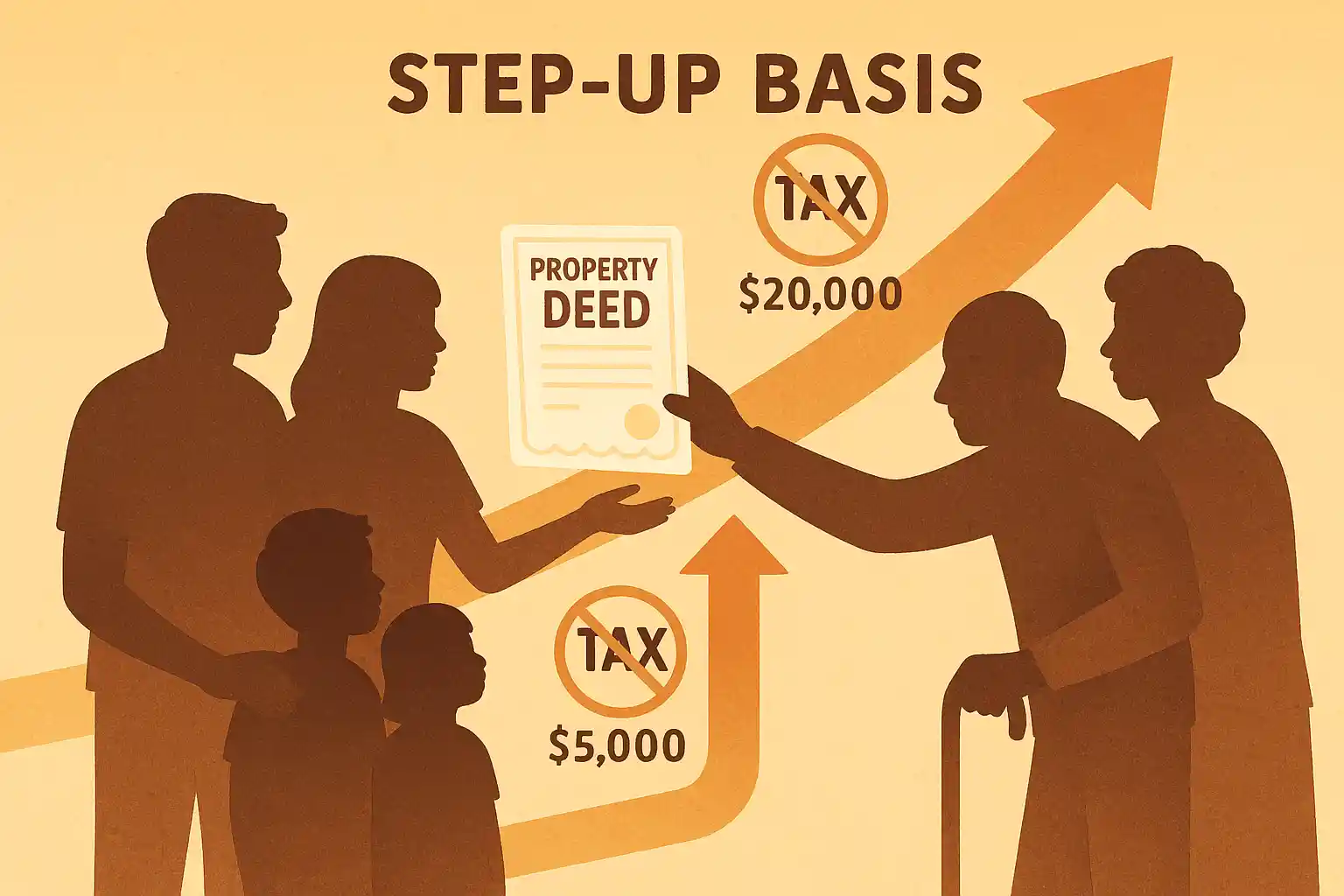
Tax Benefits of Inherited Land Sales in Ohio (Step-Up Basis)
Inheriting land in Ohio comes with significant tax advantages that can save heirs thousands of dollars compared to receiving the property as a gift. The federal "step-up in basis" rule, combined with Ohio's favorable inheritance laws, creates opportunities for tax-efficient property transfers and sales.
Understanding Step-Up in Basis
When you inherit Ohio land, you receive a valuable tax benefit called "step-up in basis" that essentially resets the property's cost basis for tax purposes:
How Step-Up Basis Works
- Original owner's basis: What they paid plus improvements over the years
- Your inherited basis: Fair market value on the date of death
- Tax benefit: You only pay capital gains on appreciation after inheritance
Example: If your parents bought land for $20,000 in 1980, made $10,000 in improvements, and it's worth $100,000 when you inherit it, your new basis becomes $100,000 - not the original $30,000.
Ohio Inheritance Tax Advantages
Ohio provides additional benefits for inherited property that enhance the federal step-up basis:
No Ohio Inheritance Tax
- Eliminated in 2013: Ohio no longer imposes state inheritance taxes
- No filing requirements: Unlike some states, no Ohio inheritance tax returns needed
- More money in your pocket: Heirs keep more of the inheritance value
Simplified Transfer Process
- Streamlined probate: Ohio's probate process is relatively efficient
- Clear title transfer: Court-supervised process ensures clean ownership
- Reduced legal complications: Established procedures protect heir interests
Calculating Your Tax Savings
The step-up basis can result in dramatic tax savings for your Ohio inherited property sale:
Comparison: Gift vs. Inheritance
If you received the land as a gift:
- Basis = Original owner's purchase price plus improvements
- Capital gains = Sale price minus low basis
- Higher tax liability on larger gain
If you inherited the land:
- Basis = Fair market value at death
- Capital gains = Sale price minus stepped-up basis
- Lower tax liability on smaller gain
Maximizing Your Inherited Land Benefits
Timing Strategies for Inherited Property
- Quick sale advantage: Sell soon after inheritance to minimize additional gains
- Market timing: No pressure to sell immediately - you control the timing
- Multiple heirs: Coordinate sales if multiple family members inherited portions
Documentation Requirements
- Estate tax return: Form 706 if estate exceeds federal threshold
- Probate court records: Official documentation of property transfer
- Professional appraisal: Establishes the stepped-up basis value
- Death certificate: Required for all inheritance-related transactions
Ohio Probate Considerations
Court Approval Requirements
Ohio probate court may require approval for inherited land sales in certain situations:
- Estate administration: During active probate proceedings
- Minor beneficiaries: When heirs are under 18 years old
- Contested estates: If family members dispute the inheritance
- Creditor claims: Outstanding debts against the estate
Simplified Transfer Options
- Transfer on death deeds: Allows property to bypass probate entirely
- Joint ownership: Rights of survivorship transfer automatically
- Small estate procedures: Simplified process for estates under $100,000
Common Mistakes to Avoid
Basis Calculation Errors
- Using original purchase price: Failing to apply step-up basis rules
- Missing improvements: Not including the deceased owner's capital improvements
- Incorrect valuation date: Using wrong date for fair market value determination
- Poor record keeping: Inadequate documentation of the stepped-up basis
Tax Planning Oversights
- Premature sales: Selling before probate completion without court approval
- Multiple property complications: Not coordinating sales of multiple inherited parcels
- State law variations: Assuming other states' rules apply to Ohio inheritance
Professional Guidance Benefits
Given the complexity of taxes on selling land in Ohio and the significant benefits available through proper inheritance planning, professional consultation is essential:
- Estate attorneys: Navigate probate requirements and transfer procedures
- Tax professionals: Calculate exact basis and tax implications
- Appraisers: Establish documented fair market value for basis purposes
- Real estate experts: Optimize timing and pricing strategies for inherited land sales
The step-up basis advantage makes inheriting Ohio land significantly more tax-advantageous than receiving it as a gift, potentially saving heirs thousands of dollars in capital gains taxes when they decide to sell.
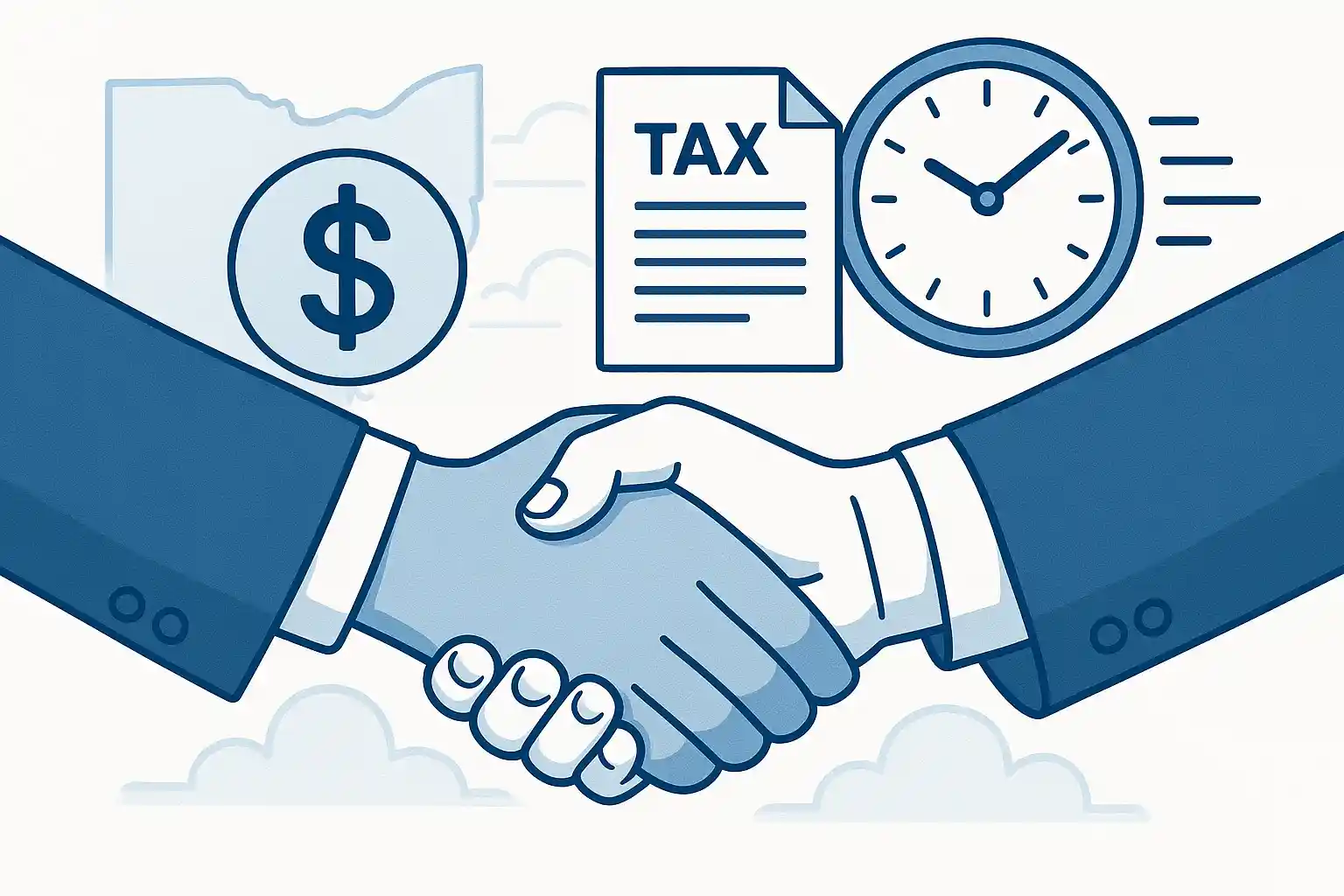
Simplify Your Ohio Land Sale Taxes with Cash Buyers
Navigating taxes on selling land in Ohio can be overwhelming with complex capital gains calculations, basis determinations, and timing requirements. Working with experienced cash buyers like Prime Land Buyers simplifies both the sale process and tax reporting while optimizing your tax situation.
How Cash Sales Simplify Tax Obligations
Professional cash buyers structure transactions to make your tax reporting straightforward and potentially reduce your overall tax burden:
Documentation Benefits
- Accurate 1099-S reporting: Professional buyers ensure correct tax form completion
- Clear closing statements: Detailed breakdown of all costs for your tax preparer
- No realtor commissions: Save 6-10% typically paid to agents, improving your net proceeds
- Reduced closing costs: Buyer pays most expenses, simplifying your tax calculations
Timing Advantages
- Flexible closing dates: Choose the tax year that works best for your situation. This can be helpful when selling hunting or recreational land in Ohio.
- Fast completion: Close in 7-14 days to meet year-end tax planning deadlines
- No financing delays: Cash transactions eliminate loan approval uncertainties
- Predictable timeline: Know exactly when your sale completes for tax planning
Prime Land Buyers' Tax-Focused Approach
As Ohio's leading cash land buyers, we understand how tax on selling land impacts your bottom line:
- Free consultation: Discuss your tax situation and timing needs upfront
- Professional coordination: Work with your tax advisor to optimize sale structure
- Complete documentation: Provide all necessary records for accurate tax reporting
- Experienced team: Deep understanding of Ohio land markets and tax requirements
Special Benefits for Complex Situations
Inherited Property Sales
- Step-up basis documentation: Help establish your stepped-up cost basis
- Probate coordination: Work with estate attorneys when needed
Investment Property Transitions
- 1031 exchange timing: Provide certainty for like-kind exchange deadlines
- Professional network: Connect you with qualified tax professionals
Don't let complex taxes on selling land in Ohio prevent you from moving forward with your land sale. Our experienced team handles the details while you focus on your next steps. Getting started with a free cash offer today.

